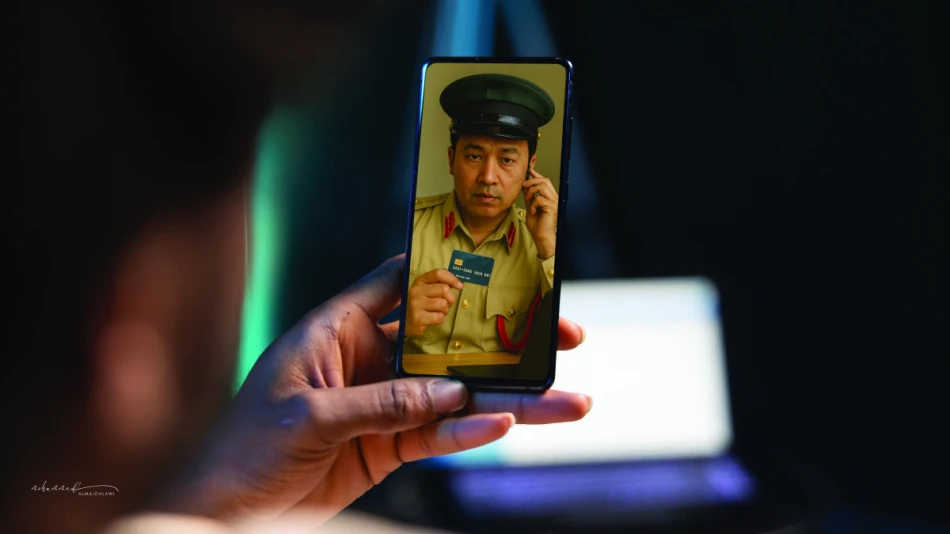
Beware Online Scammers Posing as Police, Luring Victims via Video Calls
Fraudsters Deploy Fake Police Officers in Video Calls to Target UAE Bank Accounts
Cybercriminals in the UAE have escalated their tactics by impersonating Dubai Police officers through Google Meet video calls, wearing fake uniforms and badges to intimidate victims into revealing banking credentials. Dubai Police have arrested 13 individuals across three criminal gangs using these sophisticated social engineering techniques, highlighting how scammers are adapting traditional phone fraud for the video era.
The New Face of Financial Fraud
The scam represents a significant evolution from traditional voice-only phishing calls. Criminals now initiate random video calls through Google Meet, appearing in military-style uniforms adorned with fake badges and credentials. When victims answer, the fraudsters claim to represent Dubai Police and demand immediate compliance with requests for sensitive banking information.
One victim, identified as M.A., described receiving an unexpected Google Meet call. "A man with African features appeared wearing a military uniform decorated with many badges, telling me he belonged to Dubai Police," she recounted. When she attempted to turn off the video, the impersonator became aggressive, shouting about her "behavior exposing her to accountability."
Psychological Manipulation Through Authority
The visual element adds a powerful psychological component that voice-only scams lack. Another victim, Omar Mohammed, initially received a text message claiming to be from police with a link to "update his information." This was followed by a Google Meet invitation where a person in police uniform appeared, speaking English with Asian features, claiming his accounts would be closed without immediate action.
The scammers exploit cultural respect for authority figures, particularly law enforcement, to create compliance. They typically demand victims share one-time passwords, three-digit security codes from bank cards, or other sensitive financial data under threats of legal consequences.
A Global Trend in Cybercrime Evolution
This video impersonation technique mirrors similar trends observed across major financial centers. Singapore's monetary authority reported a 65% increase in impersonation scams in 2023, while the FBI noted rising "government impersonation" cases involving video calls in the United States. The UAE's case demonstrates how criminals are leveraging widely-available video conferencing tools that became ubiquitous during the COVID-19 pandemic.
Unlike traditional email phishing or SMS scams, video calls create real-time pressure that prevents victims from consulting others or researching the legitimacy of requests. The immediate, face-to-face interaction – even if fake – triggers faster decision-making that benefits criminals.
Targeting Trust in Digital Infrastructure
The choice of Google Meet is particularly strategic. As a legitimate business tool used for education and remote work, it carries inherent credibility. Victim Samira Abdel Fattah initially thought she was receiving an invitation to an online lecture, demonstrating how criminals exploit familiarity with legitimate platforms.
Legal Consequences and Market Impact
Dubai Police's Anti-Fraud Center emphasizes that legitimate authorities never request personal or banking information through phone calls, text messages, or emails. The UAE's Federal Decree Law No. 34 of 2021 on combating rumors and cybercrimes imposes severe penalties: fines ranging from AED 100,000 to AED 500,000 ($27,000 to $136,000) and imprisonment for electronic infiltration crimes.
For financial institutions, these incidents underscore the need for enhanced customer education and multi-factor authentication systems that don't rely solely on SMS or voice verification. Banks may need to invest more heavily in fraud detection systems that can identify unusual patterns in real-time transactions following suspicious communication attempts.
Implications for Digital Security
The emergence of video-based impersonation fraud signals a broader shift in cybercrime tactics. As voice deepfake technology becomes more accessible, experts predict criminals will eventually use AI-generated video to create even more convincing impersonations of specific officials or bank representatives.
This evolution forces a fundamental rethinking of digital identity verification. Traditional markers of authenticity – uniforms, badges, official-sounding language – become meaningless when they can be easily replicated or fabricated. Financial institutions and law enforcement agencies must develop new protocols for legitimate customer contact that cannot be easily mimicked by criminals.
The Dubai Police advise residents to report suspicious communications immediately through the eCrime platform or the Dubai Police app, emphasizing that no legitimate authority will ever request sensitive financial information through unsolicited digital communications.
Most Viewed News

 Sara Khaled
Sara Khaled






